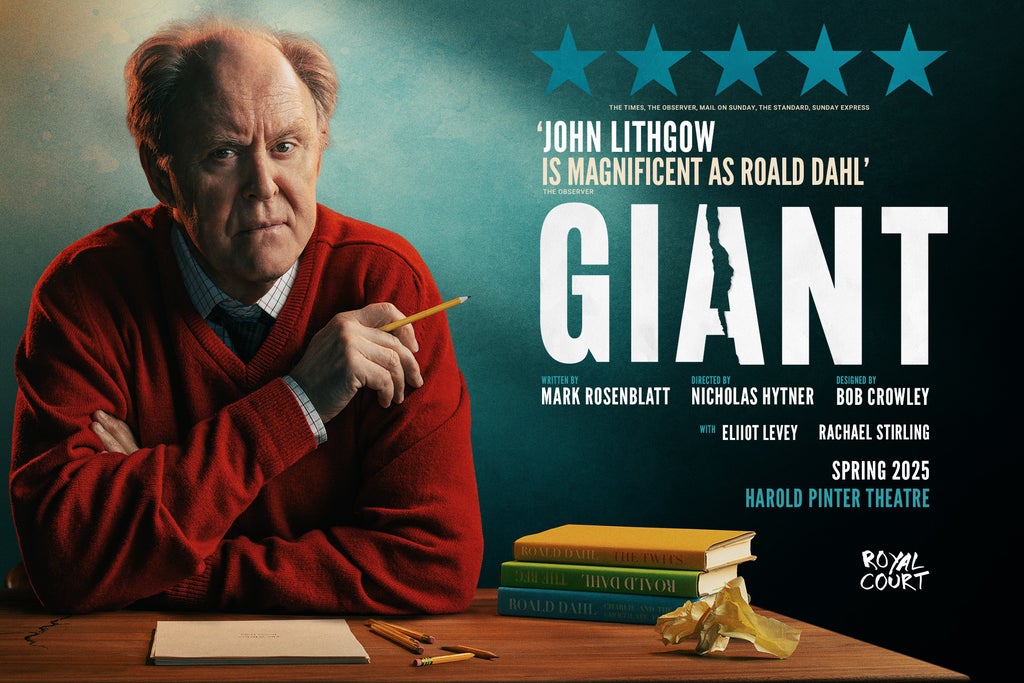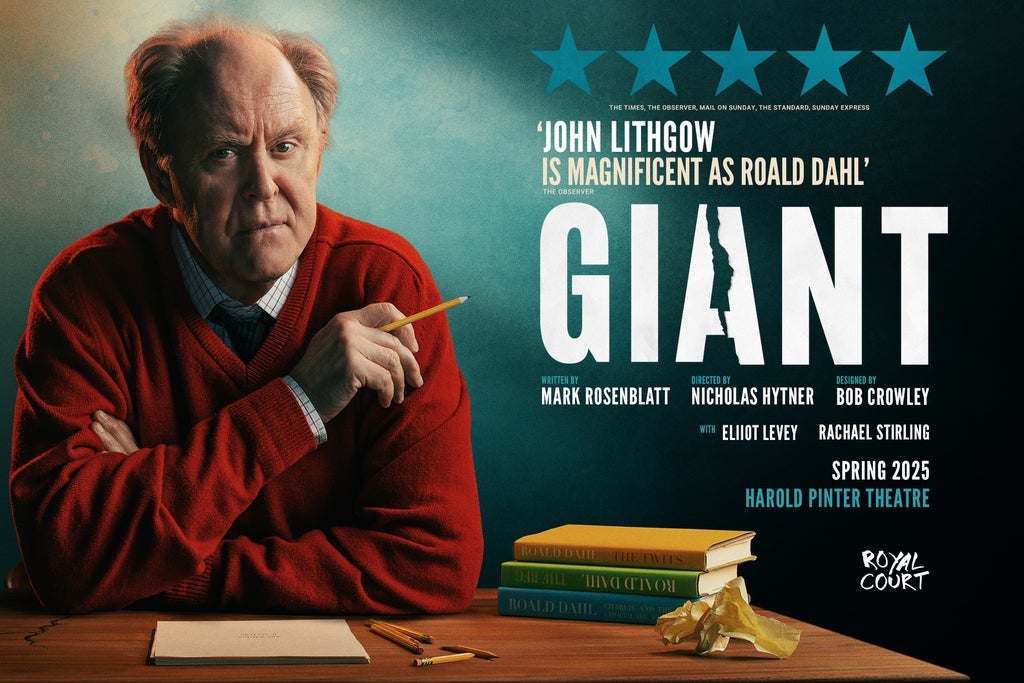Review: GIANT, Starring John Lithgow
The award-winning Royal Court hit transfers to the West End.

![]() It’s 1983 and beloved author Roald Dahl is about to release The Witches. Snobbish and short-tempered, he’s currently under scrutiny for the antisemitic language he used in a book review. Gathered in his childhood kitchen are Dahl, his wife-to-be Felicity, and his publisher Tom Maschler. They’re waiting for a sales executive sent by Dahl’s American publisher in order to compel him to retract and apologise. His piece didn’t go down well in the States and his numbers are now at stake.
It’s 1983 and beloved author Roald Dahl is about to release The Witches. Snobbish and short-tempered, he’s currently under scrutiny for the antisemitic language he used in a book review. Gathered in his childhood kitchen are Dahl, his wife-to-be Felicity, and his publisher Tom Maschler. They’re waiting for a sales executive sent by Dahl’s American publisher in order to compel him to retract and apologise. His piece didn’t go down well in the States and his numbers are now at stake.
Directed by Nicholas Hytner, Mark Rosenblatt’s playwriting debut has rinsed most of the awards found in British theatre at this point. The playwright received two nods at the Critics’ Circle Theatre Awards last month as well as an Olivier, while John Lithgow and Elliot Levey bagged both acting categories at the latter. It deserves every ounce of praise. Giant is timely. It’s sophisticated. It’s complex. It’s nuanced. It’s everything an excellent play should be. Each side of the argument is so passionate and eloquent, yet one, though just, reeks of hatred. At a stage where Kneecap have seen their US visa revoked after speaking out against the Palestinian genocide at Coachella and JK Rowling continues to spew transphobic hate supported by the government, Giant’s West End transfer is utterly momentous.
%20Johan%20Persson.jpg)
Always sophisticated, Rosenblatt’s writing is the real star of the show. His ideas burst at the seams, simultaneously intricate and straightforward. He writes a capricious man with a ferocious attitude and very prone to flattery. Lithgow introduces a man of great stature (both figuratively and literally: he towers over everybody at 6’4” with sparse tufts of hair sticking up, making him even taller) who speaks in riddles, charming in his literary devices and colourful descriptions. The renovating process is “the apocalypse” and Jewish people are “that lot”.
You allow him a degree of impropriety at the start - his mean streak when teasing Levey’s Maschler, or his continuous jabs at his illustrator, Quentin Blake - until he fully embraces his intolerant vein. His explosions of irritation turn him into a fearsome, villainous character who remains far from cartoonish. He's a man who's aware of his influence and intent.
%20Johan%20Persson.jpg)
Though this is a fictional encounter generated by historical circumstances, the context is pristinely factual. If everything else has been construed for the sake of storytelling, Dahl’s hateful review and subsequent interview are verbatim. His comments grate against the beauty of the quips and caustic sarcasm that populate the text. While Lithgow delights with his sublime delivery, Levey is a master of physicality and side glances. Deprived of his tennis match with Ian McEwan because of this emergency meeting, he winces and tenses, listening to Dahl’s tirades. Observer and handler at once, he's expressive in his cornered silence.
While Lithgow revels in his self-righteous cruelties, he breaks down his own moral compromises, spurred by Aya Cash’s fiery Jessica Stone (an entirely fabricated role, meant to be Maschler’s American counterpart). Dahl’s abuse of intellectual power materialises the gap between the British and American viewpoints: Maschler’s deflections and internalised antisemitism versus Stone’s incendiary condemnations and exuberance. It’s a mesmerising game.
Hytner enhances the hypnotic rhythm of the script by orchestrating his cast to perfection. No pause is too long, no comeback is too quick. However, where the first act is a pressure cooker of sumptuous turns of phrase and passionate invectives, the second cools down and shows Dahl in all his contradictions. A slower and more measured pace allows to concede with the terrible conflation of justice and bigotry that exists in Dahl, how language can bring so much joy and incite so much shock and anger.
Act two brings a fierce performance by Rachael Stirling, Dahl’s devoted, direct, and honest fiancée. Stirling thrives in confrontation, blooming with elegance when her character gets to call Dahl out. Interceding and refereeing, she adds an interesting dynamic by having Dahl’s personal life as her only concern, steering him towards what’s truly important. But not even her pleas put an end to Dahl’s antagonistic hatred.
%20Johan%20Persson.jpg)
Bob Crowley’s gorgeous set is permeated by beautiful unfinishedness. Acrow props support the ceiling, boxes pile up next to tools and paint, while the ghosts of various paintings haunt the walls. This expertly crafted chaos dissipates as a mere backdrop, almost an afterthought addressed by rare noises and offhand mentions. Allegorically, it could stand for the construction of contemporary cancel culture.
The play is provocative, asking tough questions about separating the art from the artist. It beckons a reflection on the consequences of free speech and analyses one of the forefathers of modern PR catastrophes. It’s also intellectually challenging: how can such a brilliant person get it so right yet so wrong at the same time? The changes in his demeanour give you whiplash, as does the horrid harmony between his brutal antisemitism and pro-Palestinian activism. Regardless of your stance, Giant is remarkable. A bold, provocative, and thoroughly gripping piece of theatre.
Giant runs at the Harold Pinter Theatre until 2 August.
Photo credit: Johan Persson
Reader Reviews
 | |||
Best Long-Running Broadway Show - Live Standings | |||
| |||
| Vote Now! |




